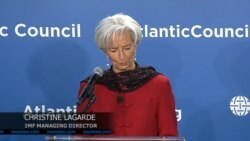Top central bank and financial officials from nearly 200 nations are in Washington for World Bank and International Monetary Fund meetings that will focus on speeding up economic growth, creating jobs, and avoiding political bickering. New studies show the pace of global growth is frustratingly slow.
Even with falling oil prices and strong U.S. growth, the head of the International Monetary Fund said the global economy only expanded around 3.4 percent last year. While that is near the average growth over the last couple of decades, IMF Managing Director Christine Lagarde said growth was uneven and too slow.
"Given the lingering impact of the great recession on people, it is actually generating hardship for many people around the world, including those countries where more than 50 percent of the youth population goes unemployed. So growth is not good enough," she said.
Lagarde urged nations to take advantage of lower oil prices to cut energy subsidies and use the saved money on education to boost long-term economic growth.
The IMF chief said progress on trade agreements could also help growth and employment, while better access to credit could help small businesses hire more people.
And she called for more investment in infrastructure to provide jobs in the short term and bolster growth in the long term by facilitating commerce.
Improved infrastructure is also the focus of the new Chinese-led Asian Infrastructure Investment Bank. Some analysts see it as a rival to the IMF and World Bank, which critics say are unfairly dominated by Western nations.
World Bank President Jim Yong Kim is urging the new bank to adhere to high standards for dealing with environmental and labor issues.
He also said nearly one billion people around the world struggle to survive on less than $1.25 a day. Kim pledged to work closely with the new bank because the enemy was poverty - not other institutions.
"Poverty is 2.5 billion people not having access to financial services like bank accounts. Poverty is 1.4 billion people without access to electricity. Poverty is having to put your children to bed at night without food. And poverty is not going to school because, in order to survive, everyone in the family needs to make a few cents every day," he said.
World Bank critics said the global lender would fight poverty more effectively if it speeded up efforts to reform its large bureaucracy and improved safeguards for people and environments affected by bank projects.
Nezir Sinani of the advocacy group Bank Information Center said he was worried by proposals to ask borrowing nations to implement labor and environmental safeguards.
"That is going to result in huge problems in many countries that we know today are not good at defending human rights or civil liberties," said Sinani.
Top World Bank and IMF officials will be discussing these and other complex issues this week with financial and bank officials from member nations around the world as they gather here in Washington.





